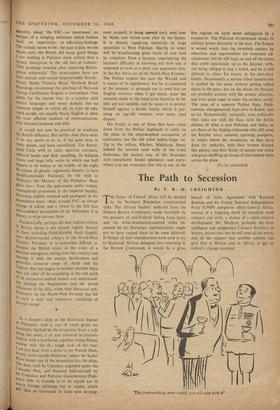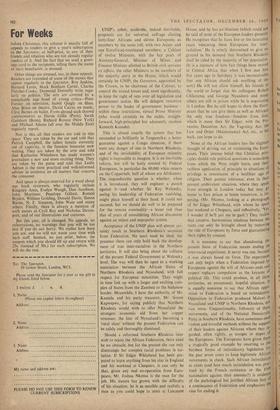The Path to Secession
By T. R. M. CREIGHTON Mite. future of Central Africa will be decided I by the Northern Rhodesian constitutional talks. The African leaders' walk-out from the Federal Review Conference, made inevitable by the pressure of anti-Federal feeling from home and the white-domination-centred views ex- pressed by the European representatives, ought not to have caused them to be even deferred. If threats of their abandonment were used to try to blackmail African delegates into returning to the Review Conference, it would be a gross breach of faith. Agreement with Kenneth Kaunda and his United National Independence Party (UNIP) delegation offers Central Africa, instead of a lingering death by inanition amid violence and strife, a chance of a rapid creative development. Mr. Macleod, probably the most intelligent and enlightened Colonial Secretary in history, knows this; but he will need all his nerve, and all the support that sensible opinion can give him in Britain and in Africa, to get so radical a change accepted.
UNIP's sober,- moderate, indeed inevitable, proposals are for universal suffrage electing forty-four Africans and eleven Europeans as members by the same roll, with two Asian- and one Eurafrican-nominated members; a Cabinet of twelve Ministers, with the key posts of Attorney-General, Minister of Mines and Finance Minister allotted to British civil servants ex officio, the other Ministers to be members of the majority party in the House, which would certainly be UNIP; the Governor, appointed by the Crown, to be chairman of the Cabinet, to control the armed forces and, most significantly, to keep the right of veto over all legislation and government action. He will delegate executive power to the leader of government business-- within these restrictions, virtual Prime Minister (who would certainly be the stable, straight- forward, high-principled but adamantly resolute Kenneth Kaunda).
This is almost exactly the system that has succeeded so brilliantly in Tanganyika; a better guarantee against a Congo situation, if there were any danger of one in Northern Rhodesia, and of the inviolability of European minority rights is impossible to imagine. It is an inevitable reform, but will be hotly resisted by Federal Europeans, in particular the 60,000 white miners on the Copperbelt, half of whom are Afrikaners. The imponderable question is whether, when it is introduced, they will engineer a putsch against it—and whether Sir Roy Welensky, seeing his leadership of Federation vanishing, might place himself at their head. It could not succeed, but we should do well to be prepared for the remote eventuality—a lesser risk than that of years of smouldering African discontent against an unjust and unpopular system.
Acceptance of the UNIP plan will almost cer- tainly result in Southern Rhodesia's secession from Federation. No tears need be shed; her presence there can only hold back the develop- ment of true inter-racialism in the Northern territories. It will also bring about the collapse of the present Federal Government at Welensky level. The way will then be open to a working association between the African States of Northern Rhodesia and Nyasaland, with full respect for European minorities. They might in time link up with a larger and exciting com- plex of States from the Zambesi to the Sudanese border. Meanwhile, I have the authority of Mr. Kaunda and his party treasurer, Mr. Simon Kapwcpwe, for saying publicly that Northern Rhodesia would wish to offer Nyasaland the strongest economic aid from her copper revenues; the fear of Nyasaland's becoming a 'rural slum' without the present Federation can be safely and thoroughly dismissed.
Should a reformed Southern Rhodesia later wish to rejoin the African Federation, there need be no obstacle, but for the present she can only disentangle her complex racial problems in iso- lation. If Sir Edgar Whitehead has been pre- pared to learn anything from his stay in England and his weekend at Chequers, it can only be that, given any real co-operation from Euro- peans, Mr. Joshua Nkomo is the man for the job. His stature has grown with the difficulty of his situation; he is as sensible and realistic a man as you could hope to meet at Lancaster House, and he has no illusions (which could not be said of most of the European leaders present). He recognises that he faces five or ten lacerating years 'educating these Europeans for inter. racialism.' He is utterly determined to give no ground in his demand that Southern Rhodesia shall be ruled by the majority of her population. (It is a measure of how fast things have moved in Central Africa that when I first met him five years ago in Salisbury it was inconceivable that any African should ask anything of the sort.) He will not allow himself, his friends Or the world to forget that his colleagues Robert Chikererna and George Nyandoro and manY others are still in prison while he is negotiating in London. But he still hopes to show the Euro- peans that he can give them as well as Africans the only true freedom—freedom from fear, which is more than Sir Edgar, with the Pre" ventive Detention Act, the Vagrancy Act, the Law and Order (Maintenance) Act, etc., at his back, can hope to do.
None of the African leaders has the slightest thought of driving out or victimising the Euro. peans. Their intense belief that Christian prifl. ciples should rule political questions is somethin8 from which the West might learn, and then ruthless application of principle to situations of privilege is reminiscent of a healthier age cif religion. Their patient tolerance, even in their present ambivalent situation, where they speak from strength in London today but may g° home to face prison at home tomorrow, is ifl posing. (Mr. Nkomo, looking at a photograph of Sir Edgar Whitehead, with whom he spent last weekend at Chequers, said reflectively, ''CS' I wonder if .he'll pit me in gaol.') They realise that creative, harmonious relations between the races can only be brought about by removing the rule of Europeans by force and guaranteeing their rights by consent.
It is nonsense to say that abandoning the present form of Federation means ending on inter-racial experiment. It never was one, because it was always based on force. The experiment can only begin when a Federation imposed bY Europeans against the will of Africans ends and respect replaces compulsion as the keynote of political life. This could produce, in all three territories, an enormously hopeful situation. It is equally nonsense to say that African opro" sition to Federation is based on intimidation. Opposition to Federation produced Malawi in Nyasaland and UNIP in Northern Rhodesia, not vice versa. Unquestionably, followers of these movements, and of the National Democratic Party in Southern Rhodesia, have sometimes used violent and forceful methods without the support of their leaders against Africans whom they re- garded, often rightly, as stooges or dupes ot the Europeans. The Europeans have given than a tragically good example by resorting to the harshest forms of intimidatory legislation for the past seven years to keep legitimate African movements in check, Such African intimidation as exists (and how much intimidation was proc" tised by the French resistance or the Josh nationalists against their enemies?) is evidence, of the pathological but justified African fear 01 a continuance of Federation and emphasises the case for ending it.



































 Previous page
Previous page